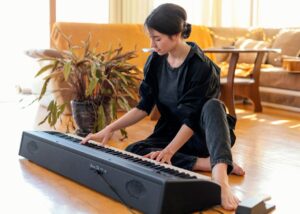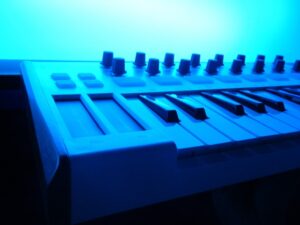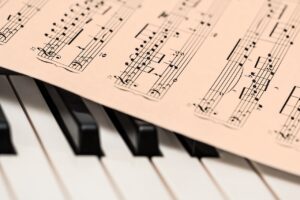Learn piano by myself: 4 methods to succeed

Learning piano by myself is synonymous with suffering, struggles and roadblocks. It’s true that without a teacher and without a clear method, you can quickly get lost. And yet, I’ve been working this way for years and I’m fully satisfied with it.
That’s why I’ve decided to help you today. Yes, I know, I’m really too nice of a guy… So I’m going to show you point by point how to get started learning piano self-taught and finally gain progression and autonomy. Let’s go!
The advantages of learning piano by myself
Learning piano by myself will bring you many significant advantages, so let’s look at the main benefits of this approach.
Flexibility and freedom: No more appointments – you work from home, as you wish and especially when you wish. Of course, this requires establishing self-discipline, but if you’re truly motivated, there will be no problem.
Financial savings: What prevented me from taking lessons when I started at 15 was very clearly the lack of money in my family. Music lessons are expensive… Today, I certainly don’t have the level I could have had being guided by a professional, but I’m doing very well, all without having spent a single euro on learning.
Development of self-discipline: As I mentioned earlier, learning piano by myself will allow you to discipline yourself. Your teacher is yourself! So try to establish a routine that isn’t too constraining, so that you can play when you really feel like it.
In summary, learning piano by myself will save you a good amount of money, while allowing you to self-manage your hours and learning time. That’s pretty nice, isn’t it? Now, let’s talk in more detail about the equipment to choose for your learning.
Piano or Synth: What are the differences?

DON’T BUY A SYNTH. There, I’ve said it. Sorry for this aggression, but here, we want to learn PIANO. We want to develop piano technique and therefore we’ll need an instrument with a minimum of tactile sensitivity.
The synth, unlike the piano, doesn’t have authentic touch – its keys are not velocity-sensitive and have no weight. So it’s absolutely not suitable for our learning. You’ll certainly find very inexpensive models, but they’ll do you more harm than good in the long run, believe me.
The piano will be much more suited to your progress. Digital or acoustic, it’s up to you depending on your space and budget. I won’t elaborate here because the subject is lengthy, but you can learn more in my article on the differences between digital piano and acoustic piano.
In summary, acoustic will be best for authentic playing, but will be much more expensive, require space, make noise, be heavy and require annual maintenance. As for the digital piano, it will be much cheaper, lightweight, easy to transport, usable with headphones and require no maintenance. However, it won’t be as sensational as a real acoustic piano, that’s certain, even though many current models do the job very well (like the fantastic Yamaha Arius YDP-145 for example).
So choose according to your budget, your space and your arrangements. Indeed, I advise against the acoustic piano if you live on the 15th floor of a small and poorly insulated apartment…
Which method to choose for learning piano by myself?
There you have it, you have everything you need, now it’s time to get started. I’m going to share my tips for learning piano by myself, or at least what worked for me.
1/ An essential accessory for learning piano by myself
Learning is even more beneficial when using the sticker kit for the keys.
This kit allows you to identify the keys for 49, 61, 76 and 88-key keyboards to allow learning notes visually at first. It includes as a bonus an ebook that will accompany you in this learning with valuable advice as well as well-known children’s songs to start easily!
See the sticker kit on AmazonThere you have it – you’re equipped with a beautiful instrument and beautiful accessories for learning piano by myself. Now, let’s get to the heart of the matter and discover how to progress effectively!
2/ Learn at your own pace with Flowkey
It’s difficult and frustrating to learn as a beginner and I understand you. We don’t know where to start and that’s completely normal. Fortunately, nowadays technology helps us and saves us tremendous time while learning in an enjoyable way. This is how I present Flowkey to you, the app for learning piano by myself very easily! It’s simple – install Flowkey on your laptop, tablet or smartphone and you can already get started! Whether you’re a beginner or experienced, Flowkey guides you step by step with a simple and interactive method:
- Follow the pianist’s movements on screen
- Play your favorite pieces
- Progress at your own pace
- Slow down difficult passages
- Work right hand and left hand separately
With more than 1,500 songs available (classical, pop, jazz, movie soundtracks…), you’ll be able to find essential music as well as your favorite songs.
Learning piano by myself and progressing has never been so motivating and accessible.
Try Flowkey now and finally realize your dream of playing piano!
Try Flowkey for free!3/ Record yourself regularly
Record yourself! Often, we don’t realize our level when we don’t see ourselves in playback. Some will think they’ve mastered a piece to perfection, and will realize during recording that many nuances are missing. It’s a bit like when I sing in the shower and think I’m the new Elvis Presley. I can tell you I’m far from it…
By recording yourself, you’ll be able to self-evaluate, but also, as mentioned above, get evaluated by a community by posting your video on a forum or on YouTube. It’s an excellent way to question my practice when it comes to learning piano by myself.
4/ Play what you love
The big advantage of learning piano by myself is indeed the freedom it offers us. No pieces you hate having to learn on repeat, no boring exercises that annoy you… Now be careful, it’s important to practice these somewhat boring Hanon-type exercises, but the most important thing in my eyes is to play what you love.
Indeed, playing a piece that’s close to your heart will be the best way to learn, by far. Because hidden in these pieces are lots of techniques whose benefits you might ignore at first glance: hand independence, arpeggios, octaves, hand extensions, movements and jumps, scales, etc…
To use my own example, I attacked the beginning of Chopin’s Étude op.10 no.3 called “Tristesse” when I only had 3 months of piano. Ask any pianist – it’s suicide to dive into that after 3 months self-taught. And yet, I did it. This piece affected me so much that I was ready to do anything to learn it.
So yes, after 3 months, we were far from a good performance, but I had done it. And this piece was an excellent exercise for the independence of my hands, because you have to manage one voice in the left hand, and 2 voices in the right hand, making one sound stronger than the other. A formidable exercise…
Moreover, if you’re having trouble finding your first pieces to get started, I recommend my article on the 10 easy piano pieces for beginners.
5/ Play often
Finally, the most important advice is probably here… Learning piano by myself required discipline. I’ve told you this enough throughout this article, but it’s really very important, that’s why I allow myself to insist.
Try to play every day. Even if it’s only 10 minutes at times, that’s already good! Everyone has 10 minutes to devote to piano, don’t lie to yourself. Of course, it’s better if it’s longer, but for busy days, not everyone will be able to devote one to two hours a day to it, and that’s normal.
Try as much as possible to play every day – you’ll unconsciously create a mental and finger exercise routine that’s very beneficial for your practice.
Let’s sum up

Here we are at the end of this article. I hope it will help you better understand my approach of learning piano by myself. In any case, these tips worked for me and allow me, even today, to flourish at the piano.
You’re going to encounter difficulties, sluggish moments and feel like you’re hitting a glass ceiling at some point, and know that this is completely normal. Use your motivation, your discipline and the tips given here to get through it!
A small note on music theory that I didn’t mention. Indeed, how do you learn your pieces? By ear, with music theory, with software? Currently, learning tools have evolved a lot, and if you don’t feel like diving into music theory, don’t worry, you can do without it. I actually learned piano without music theory, and I explain how I did it in this article.
I hope my humble advice of learning piano by myself will help you. Don’t forget to visit my digital piano buying guide if you haven’t yet found your favorite instrument. With that, I wish you an excellent day and especially good piano practice.
